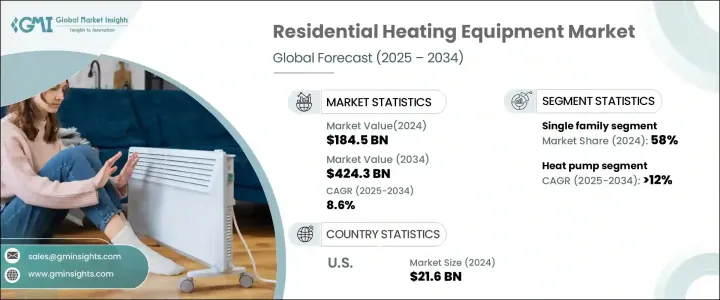
세계의 주거용 난방 장비 시장은 2024년에는 1,845억 달러로 평가되었고, CAGR 8.6%를 나타내 2034년에는 4,243억 달러에 이를 것으로 추정되고 있습니다.
이는 에너지 효율과 환경 지속가능성에 대한 의식이 높아져 소비자에게 선진적이고 환경 친화적인 난방 시스템의 채용을 촉구하고 있기 때문입니다. 지속가능한 가정용 난방으로의 전환을 촉진하고 있습니다. 도시 지역의 주택 개발과 에너지 소비 절감에 대한 지속적인 관심은 효율적인 난방 기술 채택에 박차를 가하고 있습니다.

미국 전역에서 극단적인 한파의 빈도와 강도가 높아지기 때문에 신뢰할 수 있는 주거용 난방 시스템은 단순한 기호품이 아니라 필수품이 되고 있습니다. 스마트 서모스탯과 같은 지능형 제어 통합을 통해 사용자는 에너지 사용량을 더욱 정확하게 관리할 수 있습니다.
| 시장 범위 | |
|---|---|
| 시작 연도 | 2024년 |
| 예측 연도 | 2025-2034년 |
| 시작 금액 | 1,845억 달러 |
| 예측 금액 | 4,243억 달러 |
| CAGR | 8.6% |
히트펌프의 주거용 난방 장비 시장은 2034년까지 연평균 복합 성장률(CAGR) 12%를 나타낼 것으로 예측됩니다.
단독주거용 난방 장비 분야는 2034년까지 연평균 복합 성장률(CAGR) 8%를 나타낼 것으로 예상되며 2024년에는 58%의 점유율을 차지했습니다.
2024년 미국의 주거용 난방 장비 시장 규모는 216억 달러로 평가되었는데, 환경규제, 소비자의식의 고조, 에너지 효율적인 업그레이드를 장려하는 정부의 지원 프로그램 등이 뒷받침하고 있습니다. 새로운 탄소 배출 기준에 맞는 고성능 대체품으로 교체하는 광범위한 리노베이션 활동을 통해 혜택을 누리고 있습니다.
이 시장 주요 기업은 Whirlpool, Vaillant Group, Bradford White Corporation, Ferroli, Crane, SAMSUNG, Panasonic Corporation, AO Smith, Carrier Corporation, DAIKIN INDUSTRIES, Lennox International, Robert Bosch, Hoval, Trane Technologies, Rinnai America, Rheem Manufacturing Company, GE Apps BDR Thermea Group, Arovast Corporation, Johnson Control International, VIESSMANN 등이 포함됩니다. 시장에서의 존재감을 높이기 위해, 주거용 난방 기기 업계의 기업은 다양한 전략을 채용하고 있습니다. 혁신적인 제품의 발매, 유통망의 확대, 전략적 제휴나 인수 등입니다.
The Global Residential Heating Equipment Market was valued at USD 184.5 billion in 2024 and is estimated to grow at a CAGR of 8.6% to reach USD 424.3 billion by 2034, driven by increasing awareness of energy efficiency and environmental sustainability, prompting consumers to adopt advanced and eco-friendly heating systems. Governments worldwide are setting carbon neutrality targets and implementing policies encouraging homeowners to invest in energy-efficient solutions, facilitating the transition toward smart and sustainable home heating. Urban housing development and the ongoing focus on reducing energy consumption fuel the adoption of efficient heating technologies. Additionally, the integration of advanced electric heat pumps into hybrid systems supports sustainable emission reduction within the residential sector.

The growing frequency and intensity of extreme cold spells across the U.S. have made dependable residential heating systems not just a preference but a necessity. In response, more homeowners are turning to advanced heating technologies that ensure consistent indoor temperatures regardless of external conditions. At the same time, the integration of intelligent controls, such as IoT-enabled systems and smart thermostats, is enabling users to manage energy usage with greater precision. These innovations help households cut down on unnecessary heating, which not only reduces monthly utility bills but also aligns with broader sustainability goals.
| Market Scope | |
|---|---|
| Start Year | 2024 |
| Forecast Year | 2025-2034 |
| Start Value | $184.5 Billion |
| Forecast Value | $424.3 Billion |
| CAGR | 8.6% |
The heat pump residential heating equipment market is expected to grow at a CAGR of 12% through 2034. The increasing need for energy-efficient solutions, coupled with favorable government policies, will boost the adoption of residential heat pumps. Ongoing technological developments will enhance their operational efficiency and promote environmentally friendly practices. The market is segmented into single-family and multi-family applications.
The single-family residential heating equipment segment is anticipated to drive business growth at a CAGR of 8% through 2034, holding a share of 58% in 2024. The growing demand for customized solutions to meet diverse heating needs will increase product adoption. Additionally, integrating remote monitoring systems, predictive maintenance, and process optimization will propel the industry outlook.
U.S. Residential Heating Equipment Market was valued at USD 21.6 billion in 2024, fueled by environmental mandates, rising consumer awareness, and government-backed programs that incentivize energy-efficient upgrades. The market is also benefiting from widespread retrofitting activities, where older heating systems are being replaced with high-performance alternatives that comply with newer carbon emission standards. Additionally, the shift toward electrification in residential spaces creates new opportunities for heat pumps and hybrid systems.
Key players in the market include Whirlpool, Vaillant Group, Bradford White Corporation, Ferroli, Crane, SAMSUNG, Panasonic Corporation, A.O. Smith, Carrier Corporation, DAIKIN INDUSTRIES, Lennox International, Robert Bosch, Hoval, Trane Technologies, Rinnai America, Rheem Manufacturing Company, GE Appliances, LG Electronics, Ariston Holding, Havells India, BDR Thermea Group, Arovast Corporation, Johnson Control International, VIESSMANN. To strengthen their market presence, companies in the residential heating equipment industry are adopting various strategies. These include launching innovative products, expanding distribution networks, and forming strategic partnerships and acquisitions. For instance, companies are developing advanced heating systems that integrate renewable energy sources and smart technologies to meet the growing demand for energy-efficient solutions.